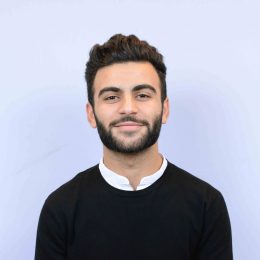
Imagine on one of your first days of a new course your professor tells your entire class to get up and walk to the window and connect the seemingly unrelated things you see outside. You struggle, but eventually connect the snow falling to a Harvard Business School case study on JetBlue you just read the previous night.
It may seem strange, but it is precisely these kinds of unconventional activities that allow students in Leadership 353: Strategic Leadership, a course taught by Kimberly Jaussi, an associate professor in the School of Management, to augment their cognitive capabilities and develop themselves personally and professionally. Unlike the common lecture-based courses which adhere to more traditional formats, those taught by Jaussi challenge the status quo in academia.
Universities are theoretically supposed to be the vibrant social institutions that enlighten, inspire and acclimate students for the transition into life after college. However, it’s not a secret that instead of a system fully dedicated to education and serving as an impetus to challenge one’s perceptions, we have a schooling system that is solidified on information being regurgitated to obtain grades.
This type of environment forces students to focus more on grades than the actual pursuit of knowledge. It is not unexpected then, that this atmosphere contributes to feelings of apathy, meaningless memorization, cutting classes and varying forms of academic dishonesty. With students worrying more about grades than engaging in their classes, it’s unsurprising that a Rutgers University survey found that 43 percent of undergraduate and graduate students admitted to cheating at some point in their collegiate careers.
Alternative education programs similar to those taught by Jaussi, however, can prove to be an effective means of edification and can mitigate the feelings of indifference toward courses or the perpetual desire of students to only focus on grades. Essentially, alternative forms of education are those that stray away from the traditional lecture-test format, where students are forced to sit at desks in rows and barely contribute to discussion. It is through nontraditional education that students can get the chance to apply the theoretical knowledge they’ve repeatedly learned about in a real-world setting. Furthermore, alternative learning experiences attempt to transcend the constraints of the traditional classroom by having classes take place in more unusual areas.
Google exemplifies this concept by creating unique work environments through nontraditional offices and clustering employees into “nest teams” of 6-8 people to foster more communication, collaboration and camaraderie. Google has found that by allowing their employees to interact with one another that they are more inclined to be engaged and produce more creative solutions to problems.
Although Google’s end goal is not to educate its employees, these ideas can still be reproduced in academia having immense benefits on the cognitive development of students and this is currently happening at Binghamton University. Leadership 353 is the embodiment of an extremely dynamic alternative educational experience. She’s stated that “holding class outside, lounges, hallways or [even] underneath desks opens parts of your brain and allows your mind to enter a high state of creativity and efficiency.”
The class itself, which I have been a part of since January, takes place in the Chenango Champlain Collegiate Center Fireplace Lounge, as opposed to a typical classroom. We sit on couches in clusters with teammates. Team projects aren’t criteria to be quickly checked off after completion on a syllabus, but do form the nucleus of the class as teams work with the same members throughout the semester.
The main project consists of consulting for a local nonprofit organization. Jaussi makes no reservations about emphasizing the intensity of the course but it is perhaps some of the most meaningful work I, and many fellow students, have done. Students are taught by Jaussi to disregard their myopic visions that see grades as the sole metric to gauge success. Instead, she encourages students to look at the greater goal of making a difference in the community.
Jaussi frequently mentions that her former students often stay in contact with her, each other and even their nonprofit organization, creating lasting relationships. Perhaps some of the most impressive tangibles to come from Jaussi’s unique course and teaching style are the hundred-page books students produce for their nonprofit organization. These books produced by teams are the synthesis of hundreds of hours of research, planning, consulting work, multiple revisions and intense refinement contain recommendations backed with financials, like ROIs, designed to ameliorate the nonprofits.
I’ve witnessed firsthand how alternative learning initiatives can allow far more collaborative and creative work to take place within the class. Alternative forms of education like this class can offer a new paradigm to universities ultimately producing substantially more multifaceted students. While the traditional methods of teaching seen in a majority of classes aren’t going away anytime soon, it’s imperative that we challenge them in order to get the most out of our higher education system.
Hooman Ibrahim is a senior majoring in business administration.


